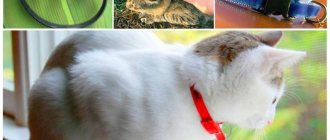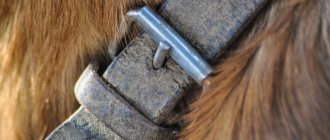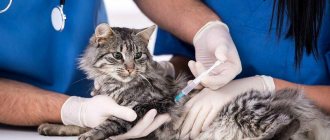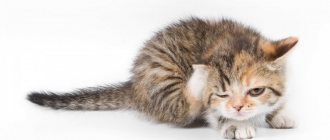Why do dogs need flea protection?
Fleas, ticks and other parasites pose a real threat to the health of the dog, as well as its owner. They cause discomfort and can cause infection with dangerous diseases. Substances released by parasites when they bite can cause an allergic reaction. Long-term flea parasitism leads to hair loss, disturbs the pet and deprives it of normal sleep. When bitten by fleas, dogs scratch the affected areas, introducing infection into the scratches. In addition, fleas are carriers of helminths, which parasitize the dog’s intestines and release toxic substances. Fortunately, there are many insect repellent products available today. One of them is a flea and tick dog collar.
How does flea infection occur and what is dangerous?
Fleas appear in a lambing cat in the following ways:
- infection occurs during pregnancy;
- parasites are passed on from other pets;
- people bring pests on clothes into the house;
- insects enter the premises from the basement, from the stairwell, from a neighboring infested apartment;
- as a result of re-infection from hatched eggs that were not destroyed during disinsection.
Parasites pose a danger to both mother and cubs:
- After being attacked by blood-sucking insects, kittens experience anemia, stunted growth and delayed weight gain.
- Pests infect kittens with worms and are carriers of dangerous diseases for the cat family: brucellosis, plague, tularemia, typhoid.
- Due to constant itching and burning caused by bites, the cat becomes nervous, irritable, and loses milk.
- Allergic dermatitis appears on the skin of kittens.
- If an animal is allergic to the parasite's saliva, it may cause difficulty breathing, wheezing, and even swelling of the respiratory system, which is deadly for kittens.
How does a flea collar work?
The collar is a strap or ribbon made of a flexible but durable material with a microporous structure. During the production process, the tape is impregnated with active substances, the required piece is cut off, supplemented with a fixative and hermetically packaged. The tightness of the packaging is a very important requirement. The collar starts working the minute you open the package. The product is attached to the dog’s neck, but the active substances it releases are gradually distributed throughout the body. Thanks to the micropores in the polymer tape, this process is quite lengthy. By selecting various materials it can be extended over several months.
The ingredients contained in the collar are designed to destroy and/or repel blood-sucking parasites, and/or disrupt the development of larvae. The active substances can be different, depending on them the effect of the collar is determined (insecticidal, acaricidal, ovicidal or repellent).
Please note that you should not expect instant results. A high degree of protection is achieved within a few days. During this time, the active substances are released from the collar and penetrate into the fatty secretion of the coat and the sebaceous glands of the skin. If the collar has expired, it must be replaced with a new one, otherwise it loses its meaning.
Types of flea collars
In fact, collars can act not only on fleas, but also on lice, lice, ticks and other external parasites. All existing flea collars for dogs can be divided into 3 large categories: destructive, repellent, ultrasonic.
Insectoacaricidal (destroying)
These collars are most effective because their action is aimed at destroying parasites. The active substances kill adults and may interfere with the growth of larvae. The validity period of the product depends on its type and is usually 2–7 months. To maintain effectiveness, the collar should not be removed from your pet, except when the animal needs to be washed. Sometimes, before the first use, it is necessary to stretch the collar a little to activate the substances (the need for this action should be indicated in the instructions).
Repellent (scaring)
Their task is to repel fleas and other blood-sucking insects. The main active substances are usually essential oils and extracts. They have a higher safety profile, but their effectiveness is lower than that of insecticides. As a rule, biocollars are used in conjunction with other, more effective means.
Most collars are universal: they are suitable for both adult dogs and puppies. Some manufacturers are developing products for children and for dogs of small and large breeds. Generally, flea collars of any type are not recommended for puppies under 2 months of age.
Ultrasonic
Theoretically, they produce high-frequency sounds that repel arthropods. The effectiveness of such devices has not been confirmed.
average cost
A parasite collar is considered a cheap product, but this is not entirely true. A high-quality imported model costs a lot. But if you consider the cost of sprays and drops, the benefits are obvious.
Prices vary from 50 rubles to 3 thousand rubles . The cost depends on the type of product and its manufacturer. The cheapest option is an accessory from BioFloR (55 rubles). A branded BAYER will cost 2 thousand 600 rubles.
ATTENTION ! You should not buy cheap Chinese models that have crowded the market. The effects of their substances have not been fully studied, take care of your pet’s health.
We suggest that you familiarize yourself with other methods of fighting fleas. On the pages of our website we will tell you what the most effective means are, how to get rid of these insects in the apartment and how folk methods work. Find out also about:
- how Bars preparations and flea drops work;
- what products are suitable for destruction in the home and what manufacturers produce them;
- how to destroy parasites on humans?
How to figure out who is affected by a flea collar
Typically, the range of parasites that the collar is effective against is indicated on the packaging. It’s a little more difficult to understand the special terminology, but it’s also possible.
“Cidal” action implies the destruction of the parasite. Acaricides destroy ticks, insecticides destroy insects. Insectoacaricides – both. Inhibitors of chitin synthesis have ovo- and larvocidal effects. These are substances that disrupt the process of molting and oviposition in insects. Ovo is an egg, and larva is a larva. Such substances are relevant if the animal is infected with fleas, lice or lice, because eggs are more difficult to destroy than adults. Repellents are substances whose odor repels arthropods. They can be either natural (essential oils) or synthetic (“DEET”, etc.). Multi-component collars often contain insectoacaricides, ovicides, and repellents.
Pros and cons of safety collars
If you follow the instructions and recommendations of a specialist, a flea collar for a dog will become a reliable barrier against blood-sucking insects and ticks. This tool has a number of advantages:
- Ease of use;
- variety of choice (to determine the appropriate collar in each case);
- high safety profile (the collar is securely fixed to reduce the risk of it being removed, biting, or licking chemicals);
- duration of action;
- reasonable price.
Often, a collar looks like a more convenient means than drops and sprays, however, it also has its drawbacks:
- the product requires getting used to, the dog may be against another strap around the neck;
- insecticides and repellents may cause allergic reactions;
- the smell of essential oils may seem too intense;
- Since the substances are concentrated in the plastic tape and not on the skin, they take time to become active. So collars are not the best choice for instantly getting rid of fleas.
Rules of application
Despite their popularity and high degree of safety, dog collars are used strictly according to the instructions. It must be remembered that improper use of the product can cause a lot of inconvenience to the animal.
- The collar is fixed on the dog in such a way that there is a gap of 1–1.5 cm (an average finger thickness) between it and the neck. The strap should not dangle or fit too tightly.
- Each dog has its own type of collar. This takes into account her weight, neck size, and health indicators. Collars are not recommended for small puppies for safety reasons.
- The collar must be replaced with a new one immediately after its service life expires. Typically, such products do not last more than 4-6 months, but the specific period is always indicated in the instructions.
- You cannot use a collar and apply other anti-flea products on the same day, as this can lead to poisoning of the animal.
- It is best to buy a flea collar for your dog at a large pet store or veterinary pharmacy, so you can be sure of its quality.
Precautionary measures
- Most collars (especially the insecticidal and insectoacaricidal groups) are contraindicated for pregnant and lactating females, sick and weakened dogs, and puppies. Collars with phytocomponents have fewer contraindications, but can cause an allergic reaction.
- During the first hours of wearing the collar, the dog should be under constant supervision. If your animal experiences any unpleasant symptoms (lacrimation, vomiting, fever, skin irritation, etc.), you should immediately remove the collar and consult a specialist.
- Do not store a flea collar (especially an opened package) near food, personal belongings, or in places accessible to children and animals.
- It is important to ensure that your four-legged pet does not try the collar on its teeth, as its active substances can cause disorders of the digestive and nervous systems.
How to use?
Before putting the collar on the cat, you need to stretch it a little so that the microcapsules burst. A white coating will appear on the surface.
Insecticides and repellents are toxic chemicals, but their concentrations are low and they are not dangerous to a healthy adult cat when worn correctly. But you should not allow the cat to chew, lick the collar, or wear it if there are open wounds on the body.
The straps are made from moisture-resistant materials; the active ingredients do not react chemically with water. When exposed to rain, they do not lose their protective properties.
Animals may have individual intolerance to certain protective components. If the cat is restless, itchy, the skin under the strap is red, or hair is falling out, remove it. Consult your veterinarian and use a cat safety collar with a different active ingredient.
Recommended Collars
BARS®.
The insecticidal collar is used to protect against fleas, ixodid ticks, lice, and lice. The polymer tape can be 80 cm long (for large dogs), 50 cm (for medium dogs) and 35 cm (for small dogs). The collar contains fipronil and diflubenzuron. The insect growth regulator (diflubenzuron) suppresses the growth of integumentary tissues of parasites, disrupts the development of larvae in eggs and molting, and prevents pupae from fully developing. Fipronil is an insectoacaricide. It is not absorbed into the systemic circulation. Its accumulation occurs in the epidermis, hair follicles and sebaceous glands. With the secretion of the sebaceous glands, the substances are distributed over the surface of the skin and provide a long-lasting protective effect. The period of use of the BARS® collar is up to 4 months. It is not recommended to use the collar for puppies under 2 months of age, sick and weakened animals, pregnant (in the last third of the term) and lactating females.
FitoDoc®
. The repellent collar is designed to repel ixodid ticks, fleas, and other insects. It comes in 3 sizes: 80 cm (for large breed dogs), 50 cm (for medium dogs) and 35 cm (for small dogs). The collar contains natural ingredients: essential oils of margosa, citronella, eucalyptus, tea tree, lavender. They also accumulate on the epidermis, hair follicles and sebaceous glands of the animal's body and provide a repellent effect. The FitoDoc® collar provides protection for 3 months against fleas and other insects and up to 5 weeks against ticks. The product should not be used on puppies under 2 months of age.
4 with a ponytail®
. This collar is designed to repel fleas, lice, lice, scabies and ixodid mites. It contains essential oils of citronella, lavender, geranium, peppermint, eucalyptus. Active substances accumulate in the sebaceous glands and have a detrimental effect on insects. The collars are available in three sizes: 35, 50 and 65 cm. The product has a high safety profile and is usually well tolerated by dogs of different ages and breeds, including sick and weakened animals, pregnant and lactating females. It should not be used only for puppies younger than 2 months and with individual intolerance to the active substances. When worn continuously, the collar provides protection against insects for up to 3 months and against ticks for 4 weeks.
Folk anti-flea remedies
The optimal choice for combating parasites in a nursing female remains traditional methods that have been tested over the years and have proven their safety. The desired result is achieved after applying:
- A mixture of baby shampoo and tincture of milk thistle or yarrow. To prepare the product, take 50 g of a washing product and a tincture of a medicinal plant, and dissolve the mixture in 400 ml of boiling water. The animal is bathed in the cooled mixture, the foam is left on the fur for 15 minutes, then washed off.
- Tinctures of dried tansy and bitter wormwood. Take 50 g of each herb, pour 1 liter of boiling water and leave for 3.5 hours. Then the infusion is strained and additionally diluted with 500 ml of warm liquid. The resulting medicinal solution is wiped over the animal's fur or doused. After a quarter of an hour, the cat is washed with the usual shampoo and dried as usual.
- Tinctures from wormwood seeds. To prepare it, 2 tbsp. l. seeds of a pungently smelling plant are poured with boiling water, left for 4 hours, and then the cat is washed with the addition of laundry soap.
If the pet owner is afraid to carry out even such treatment, then the only remaining method of combating parasites is manual combing. A comb with fine teeth and rounded ends is passed over the entire body of the animal, selecting fleas and crushing them.
Parasites are easy to distinguish on the skin: they look like small black dots. The situation is more difficult with flea eggs - they are smaller in size and almost invisible, but if you do not comb them out, then in a week the pet will again be covered in parasites.
A nursing cat needs care and health protection much more than other pets, so treatment for fleas should not be delayed. At the same time, the product for antiparasitic treatment is selected to be safe and natural, so that neither the female nor the cubs feel any side effects.











